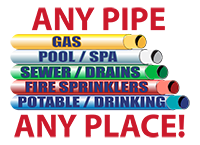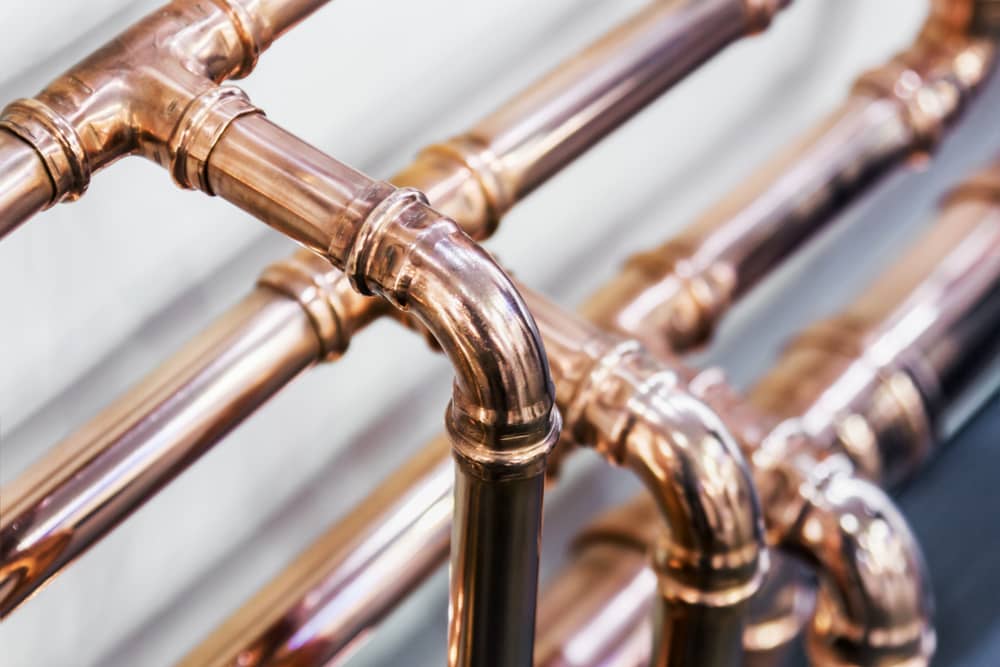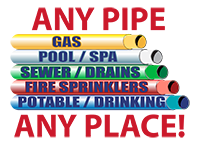Investing in your plumbing is a great way to improve your home. While looking for ways to update your plumbing system, you may want to look into installing new pipes. Copper pipes warrant a closer look.
The pipes in your plumbing can significantly affect how the entire system works. The choice you make will help determine if you’ll face numerous plumbing issues in the future or if they will be few and far between.
For this article, we’ll focus on copper pipes and how they fit inside the plumbing system. Use the information you learn here to decide if those pipes make sense for your place of residence.
Why Are Copper Pipes Used for Plumbing?
Copper is one of the many materials used for creating pipes. So, why is copper among the more popular options available? There are different reasons why they often use copper pipes, and we’ll discuss them in this portion of this article.
They Last for a Long Time
One of the reasons why so many homeowners and plumbing professionals like using copper pipes is because they last for a long time.
Copper pipes used as supply lines typically last for fifty years. Take note that the expected fifty-year lifespan is on the low end for copper pipes. They often last longer than that.
According to Today’s Homeowner, the longevity of copper pipes is also affected by the specific type you’re using.
M-type pipes are the ones with the shortest lifespan among your copper choices. The M-type pipes max out at around fifty years, although they do sometimes fail to hit that mark.
M-type pipes don’t last that long due to how thin they are. The lack of material makes them more susceptible to the regular wear and tear of residential water usage.
Next up are the L-type pipes, and they feature considerably more copper than their M-type counterparts. Thanks to the amount of copper used, L-type pipes are expected to last for fifty years at least, although they can remain functional for nearly double that amount of time.
L-type pipes are ideal for residential settings because of their durability and affordability.
Finally, you have the K-type copper pipes. The K-type pipes are incredibly durable. They can remain in good working condition for well over one hundred years.
K-type copper pipes usually aren’t installed inside homes because they are overqualified for the residential setting. Many homeowners also balk upon learning how pricey the K-type pipes are.
They Keep the Water Protected from Pollutants
Potential contamination is always a concern when it comes to pipes that you use for plumbing. You don’t want to use pipes that will carry contaminated water into your home.
Opting to use copper pipes is a good move if you want to minimize the chances of contaminated water flowing into your home. The copper walls do a great job of keeping external pollutants at bay.
They Are Good Conductors
Unlike some of the materials they use to make pipes, copper is a good conductor. It does a great job of retaining heat, so it is ideal for transporting hot water to the spots where you need it.
Copper also holds up to fire well. They can hold up well even in the aftermath of an accident.
They Are Malleable
The malleability of copper pipes contributes to why they are so commonly used. It’s easier to adjust the shape and fit it over a joint because of its inherent malleability. That’s not something you can say about the other types of pipes.
They Are Lightweight Pipes
Working with so many heavy pipes throughout the day can be tiring. Copper pipes don’t present that problem. Many plumbers like working with them because they are lightweight and easy to move around.
They Are Recyclable
One more reason why they often use copper pipes is that they don’t go to waste at the end of their lifespan.
Copper is a material that can be recycled. Instead of the copper pipes going to waste, they can transform them into other materials that will still be useful in other ways. Copper.org also notes that the material even retains a great deal of its metallic purity after getting recycled.
The Drawbacks of Using Copper Pipes
If copper pipes only had the characteristics detailed above, then they would probably be in every home. That’s not the case, though, and that’s because copper pipes still have their weak points.
They Are Not Compatible with All Types of Water
Some homeowners don’t use copper pipes because they cannot do so. Copper is not compatible with overly acidic or alkaline water.
Copper works best with water that has a pH level in the range of 7.0 to 8.4. The material can still work well with water with a pH level as low as 6.5, but that’s about as far down as it will go.
What happens if the water moving through the copper pipes does not fall within that range? In all likelihood, the incompatible water will start to affect the structural integrity of the copper pipes. The water may corrode the copper or leech the copper as it moves along your plumbing system.
After being corroded, bits of the pipe will wind up in the water supply. That copper-infused water will then make its way into your home. Ingest enough of that water, and you could get sick.
Hopefully, the pH level of the water in your area is compatible with copper so you can keep your options open. If it doesn’t fall within the safe range, though, you’ll need to consider other options.
They Are Expensive
Cost is also a concern when it comes to copper piping. Many of the modern alternatives to copper pipes are more affordable.
If you’re completely renovating your home or building it from scratch, you may not have enough room in the budget for copper pipes. You can save money by installing other kinds of pipes.
The Causes of Copper Pipe Corrosion
We’ve already noted in this article that some copper pipes can last well over fifty years. Some may even remain useful for up to a century. If all goes according to plan, you won’t need to worry about them for a long time.
Still, you cannot completely ignore the possibility of the copper pipes corroding even if the water in your area falls into the ideal pH range. Detailed in this section are the potential causes of copper corruption. Watch out for them if you want to keep your copper pipes intact.
Soil Quality
Copper may degrade faster if you cover it with certain types of soil.
According to Copper.org, soils that contain plenty of organic matter can be bad news for copper pipes. The same holds true for certain types of inorganic soil.
Like with water, it’s the acidity level of the soil that poses a threat. The acidity can continually wear down the copper.
Chlorine
Chlorine and copper do not play well with one another. Chlorine has a corrosive effect on copper, and you need to keep those two substances apart as much as possible.
Water with traces of chlorine can be damaging to the walls of copper pipes. You may also be doing damage to your copper pipes if you like using disinfectants that feature chlorine at home.
Electricity
Direct currents of electricity can harm copper pipes. You probably don’t have electricity going to where your pipes are, but establishments close by may release stray currents into the ground. Transit systems, transmission systems, and mining equipment are known for letting some stray currents loose.
High Water Pressure
Regularly flowing water is not going to do damage to copper pipes. However, if the water going into your home is constantly moving at high speeds, it may start to wear down the copper. The copper pipes will degrade faster if you continually expose them to the high pressure of the swiftly moving water.
Improper Installation
The copper pipes in your plumbing may also corrode earlier than expected if they were not installed correctly. Improper installation may expose the copper pipes to corrosive elements that they normally wouldn’t be. Even though copper pipes are indeed quite durable, they won’t stand a chance if they are exposed to damaging elements.
You should work with professional plumbers if you want to avoid any troubles by incorrectly installed copper pipes. They’ll ensure that the copper pipes are in the right place and remain useful parts of your home for several decades to come.
The Signs That Your Copper Pipes Are Corroded
You should not take corroded copper pipes lightly. They can do real and lasting damage to your home and even affect your health.
Act quickly if you have copper pipes that are already starting to corrode. Keep an eye out for the symptoms of corroded copper pipes mentioned below to protect your home and your loved ones better.
Visible Damage on the Copper Pipes
The early signs of copper pipe corrosion are not going to jump out at you and grab your attention, but they’re not impossible to spot either.
To find out if you have problems with your copper pipes, go ahead and take a closer look at them.
Look for rust while inspecting the copper pipes. Use your fingers to check for rust if you’re having a tough time differentiating it from the appearance of the copper.
Leaks are also signs of trouble for copper pipes. Check the pipes themselves and below them to see if there are traces of leaking.
Water Discoloration
Did the water from the faucet look weird while you were washing your hands? Don’t assume that your eyes are playing tricks on you. The water truly could be discolored, and that may be due to deterioration.
The water may take on a yellowish or even bluish hue if traces of copper start to fall into it. If you’re not completely certain that the water is discolored, fill up a transparent glass and examine it that way.
Unusual Odor Coming from the Water
Water that has bits of copper floating around in it gives off a different odor. It’s an unpleasant smell and something that you’ll likely have a visceral reaction to as you bring it closer to your nose.
The odor should serve as enough of a warning to you. Refrain from even tasting that water because doing so could cause some health issues.
How Can You Prolong the Life of Copper Pipes?
Since you went through the trouble of investing in copper pipes, it would be in your best interest to keep them functional for as long as possible.
Now that you know the main causes of copper corrosion, you can protect the new pipes in your plumbing system better.
Cleaning up the copper pipes regularly is also a good idea. You can use commercial cleaners or household items to keep the copper pipes free from debris. If it’s been a while since you last cleaned them, you may want to let the professionals work on them.
Phosphate feeders also do a great job of protecting copper pipes. They are especially good at keeping the inner walls of the copper pipes protected, which is important because you cannot clean those directly.
Contact Your San Diego Residential Plumber For Help With Your Copper Pipes Today!
Copper pipes can be great additions to your plumbing system, but someone needs to install them properly if you want to get the most out of them. Partner with us at San Diego Plumbing & Pipelining, and we’ll handle the installation of the copper pipes. Contact us today and find out how we can help improve your home’s plumbing system.







